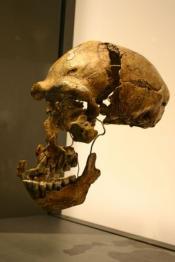Aggregated News

On the outskirts of Beijing, a small limestone mountain named Dragon Bone Hill rises above the surrounding sprawl. Along the northern side, a path leads up to some fenced-off caves that draw 150,000 visitors each year, from schoolchildren to grey-haired pensioners. It was here, in 1929, that researchers discovered a nearly complete ancient skull that they determined was roughly half a million years old. Dubbed Peking Man, it was among the earliest human remains ever uncovered, and it helped to convince many researchers that humanity first evolved in Asia.
Since then, the central importance of Peking Man has faded. Although modern dating methods put the fossil even earlier — at up to 780,000 years old — the specimen has been eclipsed by discoveries in Africa that have yielded much older remains of ancient human relatives. Such finds have cemented Africa's status as the cradle of humanity — the place from which modern humans and their predecessors spread around the globe — and relegated Asia to a kind of evolutionary cul-de-sac.
But the tale of Peking Man has haunted generations of...



